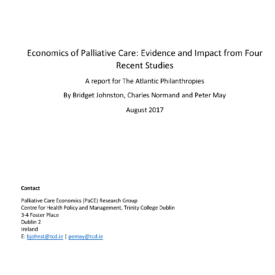Economics of Palliative Care: Evidence and Impact from Four Recent Studies
Resource type: Research Report
Bridget Johnston, Charles Normand and Peter May |
This report presents findings from four recent economic studies of palliative care. Three of the studies were funded by Atlantic; the fourth was funded by the National Cancer Institute and National Institute for Nursing Research in the United States, with the economic analyses conducted through an Atlantic-supported research collaboration.
The studies were undertaken out of a concern that current approaches in economic evaluation, which focus on health-related quality of life, do not capture the full impact of palliative care interventions or many attributes of care or process valued by patients.
Key findings and policy implications from these studies are:
- Palliative care policy should be based on evidence of patient preferences, which may differ from the preferences and assumptions of both patient caregivers and health system decision-makers.
- People accessing palliative care often receive significant support from family and informal caregivers, which all have a cost implication for society.
- Long-term policy considerations must include potential payment mechanisms to reward informal care and reduce unnecessary formal health care utilization. They should also target people who live alone or in isolation and cannot avail of informal care and may be underserved.
- Timely palliative care following hospital admission for adults with advanced cancer is associated with lower cost of care, and this association is stronger when the intervention is provided earlier in the admission.
- The cost-effectiveness of hospital palliative care appears to be greater for the sickest patients so it is they who should be prioritized for scarce palliative care resources.
Atlantic commissioned this report.
